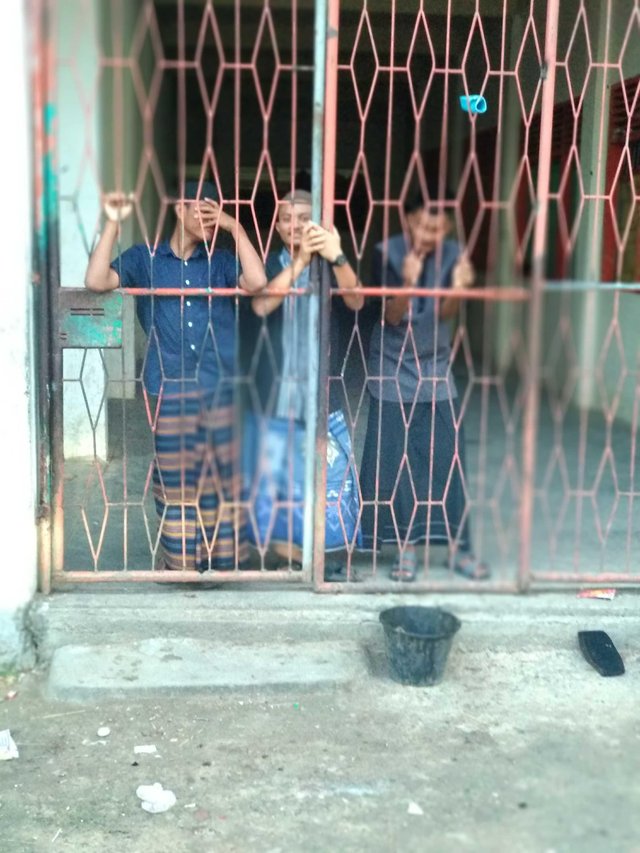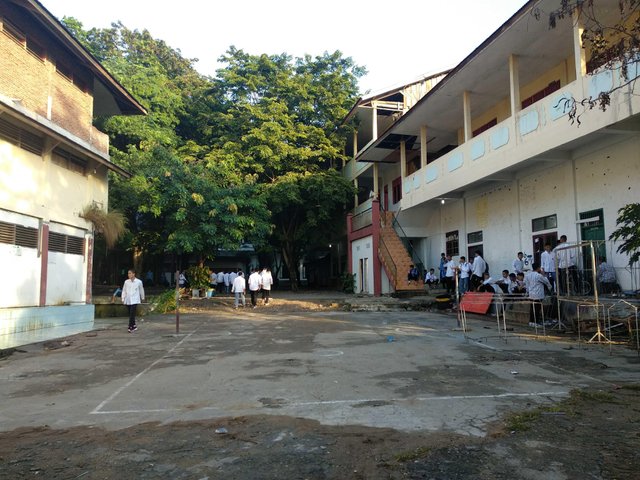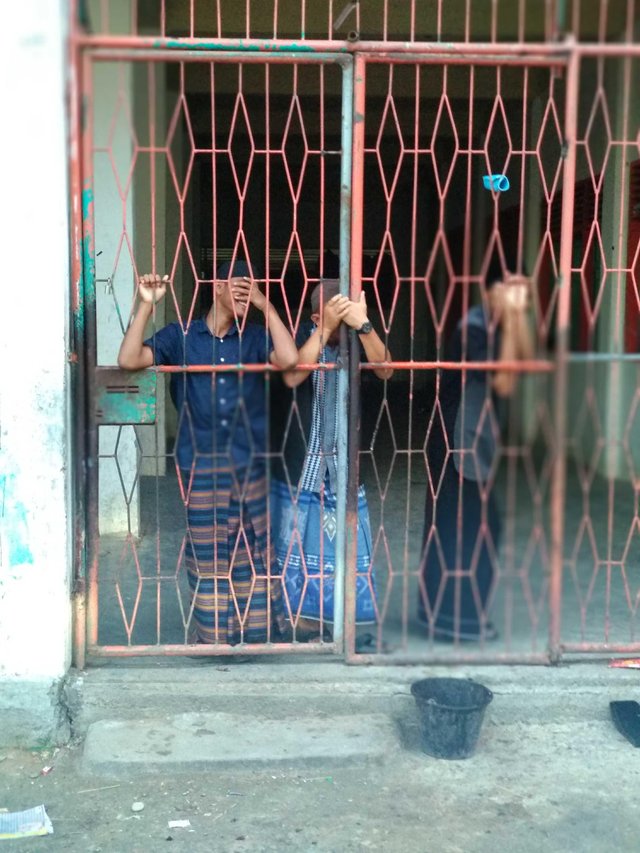The story of life in a holy prison or integrated school

Ma'had. Do you know what is ma'had?
If this question was addressed to my grandparents, let alone my great-grandfather might not know.
But, now the word ma'had is very popular. If anyone doesn't know maybe maybe he is an inland person or someone who is a believer. However, for the sake of justice (what is the connection?) I will explain a little. Like a teacher. Stylish, little, not bad, right ?!
Look.. Ma'had is a place to support. Do you know, santri?
Santri are people who study Islam. So, ma'had is a place to study Islam. People who graduate from ma'had are usually called clerics.
Wow, cool, huh! Chaplain! Ma'had is also the same as a boarding school or commonly abbreviated as ponpes.
Ma'had is the same as Ponpes. That is, both places are studying Islam. Globally it is.
But, in my opinion, there is a difference between Ma'had and Ponpes. What is that?

First, the word ma'had seems more modern. Whereas ponpes is more traditional.
Secondly, usually the building of Ma'had is grand, large and good.
Having more modern and complete facilities and infrastructure. While cottage buildings are usually simple.
It even seems like an ordinary house.
Third, the teaching method used in ma'had is more creative and attractive.
Fourth, the lessons given in Ma'had are not just religious knowledge, even combining religion and science.
In addition to the interpretation, hadith, fiqh, etc, there are also language lessons in English (English, Indonesian, Arabic), chemistry, biology, geology, etc.
Whereas in ponpes more often study religious sciences only.
Now I know, it's the difference between ma’had and ponpes. What do you think, are there any other differences that have been missed?
If you can add it, please!
You must have known, if I was also a ma'had student. I have lived in Ma'had for a long time.
How long, huh? Wow, I almost forgot how long I was here. But, really I didn't think too much about it.
I even tried to forget it. Why?
Cuba answered why didn't I really think?
Because, according to people's words, thinking about something makes the mind burden.
If I always think and count how long I stay here, I might be strees. My life here is not calm.
Not calm. Makes me not at home. Instead of thinking about things that don't need to be better learning. I entered the ma'had in to learn not to count how long I lived.
Right, right?

However, I'm also not a stingy person, you know! If you ask how long I've lived in ma'had, I want to answer it.
As long as you don't just faint! It's a surprise, but don't use fainting, huh.
Want to know, right? Ok! Listen, huh! I have been going home. hemm.. counted from the level of tsanawie till now it has been 9 taon! 9 years old, bro! Wow, long time ago, right !?
Do you think it's old, no? So, if I only think about my old age here, I think I've been out of here. It's too long, huh!
Mondok is a lot of love.
Maybe even more sorrow than it likes. But for me all that I consider to be trinkets of life.
That is, everyone who still lives in the world must feel sorrow. Both those who are lodged and those who do not go home. Therefore, I always respond with a reasonable attitude.
In the past, while still sitting at the level of tsanawie, the days that I passed felt heavy.
Memories of living with your mother, father, and relatives are still often heard. Memories about home and place of residence are still often imagined.
These memories often envelop my long days. So, it causes a desire in the heart to go home. Makes me not feel at home in this ma'had.
However, thank God, all that I can pass. Thanks to the blessing of Allah Ta'ala I can still live in ma'had until now.
When I remember the past, I sometimes feel concerned. However, sometimes also feel depressed. Why are you concerned?
Because many of my generation's friends did not continue their studies. They choose to leave ma'had.
Not at home! That's one reason. Indeed, there are many reasons they give, but actually it is just a pretext. What they really want is just to get out of ma'had.
They don't want to always live bound. The rules that exist in ma'had have curbed many of their desires, so they want to feel free life. Free from the rules of ma’had.
According to the teachers, the state of the soul of a child who just entered adolescence like me and my friends was still not stable. Children like that cannot organize their feelings.
They cannot place themselves in their place. So, the regulations made for their good are considered burdensome.

At Tsanawie, my situation is no different from my friends. I also sometimes break the rules. I also sometimes don't study for various reasons. I tell you honestly.
I am not a good santri, but I also don't want to consider myself a naughty santri. Hi.. hi. self defense, here! Indeed, really, really! I'm not a bad student.
I mean, it's not really bad, like that. Even after graduating from Tsanawie, I was not remembered as a naughty santri.
Alhamdulillah! You know it's not the secret?
Why am I not considered a naughty santri even though I often break the rules? The secret.. because the violations that I did so far were not discovered. Innalillah! How come, it seems like that! Astaghfirullah. astaghfirullah. not proud, but the dark side of my politeness gives one lesson:
if you don't want to be labeled as a bad person or a bad name or other negative, then don't let evil or delinquency or other negative actions be discovered by someone else! If it is found out, then it will be the result.
But, don't be proud first, you know! Because, there are other lessons you must know.
Listen carefully to this lesson: even though your evil deeds are not discovered by humans, know that Allah subhanahu wa ta'ala always sees what you do! The crime you are doing will surely get a reward in kind! Astaghfirullah ... so, I have to ask forgiveness often, here. Astaghfirullah.
please forgive me Got
Astaghfirullah ...
Holy prison. Oh yes. I forgot the title of this article. Holy Prison. Is that a sacred prison? How come there is a sacred prison? Eitt! Don't get me wrong first! The holy prison is not the place where prisoners are held. Nor is the place where the prisoners live.
So, what? What's up? The holy prison is the name of my friends at Tsanawie first for this beloved ma'had. Wow, why is Ma'had called a prison? Well, that's how it is.
We used to not like regulations, which often violated the rules regarding our ma'had as a prison. We give this designation not without reason. We have a reason.
Actually the reason is simple. Are not people living in ma'had like living in prison?
The many regulations that are made narrow the space for students. The regulations that exist are a lot of freedom. One of them is the freedom to exit the complex. Ma'had has territorial boundaries that cannot be violated.
Every santri who goes beyond these limits means he has committed a violation.
Therefore, every day the students can only circulate around the complex.
Their condition is like a bird in a cage. At best, they can only look at the outside of the boundaries. Or, if some religious teachers invite them out to exercise.
Isn't this situation like a prison ???
Then, why is it holy? Yes, obviously! Because, even though the situation here is like a prison, every day, the students learn the Qur'an. Every day, they read hadith. Every day, they read religious books. So, even though they cannot freely leave the complex, they are always surrounded by religious things.
Right, right? That is the reason for the emergence of the term Holy Prison!
In the past the term sacred prison was widespread among santri. Even religious teachers know this. But now, I have not heard it again. Maybe there are still some who use this term, but it doesn't reach my ears.
During the aliyah (sma) level, this term has never appeared. Because, the santri who often buzzed were gone. Most of them are not in ma'had anymore.
They have been out of here. They have got the freedom they crave! Sob..hiks..
Rinse a little story about the sacred prison. "Prison" that has been my home for many years.
"Prison" where I study. "Prison" that educates humans does not know anything about being a human with religious knowledge.